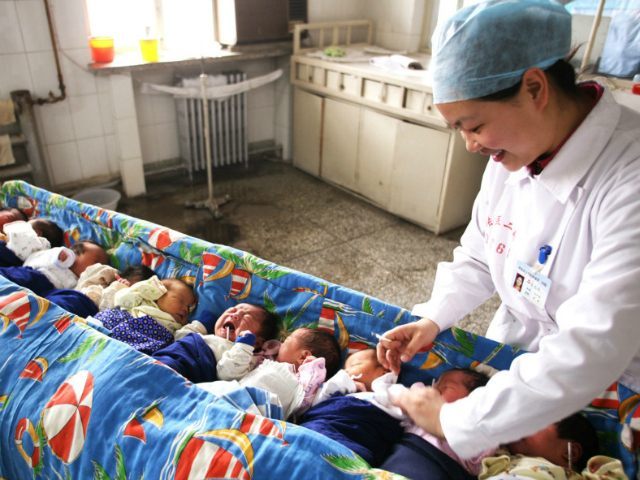China’s Global Times propaganda outlet attempted to calm mounting concerns about the nation’s collapsing birth rate on Wednesday, assuring readers that China’s “capacity for macro-control is the strongest in the world” and will strong-arm families into growing.
Communist dictator Xi Jinping announced the implementation of a government policy that allows couples to legally give birth to three children this week, one more than the previous “two-child policy” permitted. Prior to 2016, the Communist Party allowed each couple only one child, a policy that resulted in the killing of 400 million people, most believed to be baby girls. The mass killing of girls has resulted in a significant shortage of women of child-bearing age and a population featuring nearly 35 million more men than women.
Chinese experts have warned the country may soon boast the world’s lowest birth rate if the trend does not reverse. Demographers abroad have suggested that time may come sooner than Beijing admits, suggesting government statistics are overreporting the number of births.
The policy applies only to women who belong to China’s ethnic Han majority. Minority women do not face the same legal restrictions but many, most prominently women of Uyghur ethnicity, have been subjected to a mass forced sterilization campaign that has kept their birth rates low. Independent estimates suggest the Communist Party has forcibly sterilized hundreds of thousands of women; eyewitness testimonies from survivors of Uyghur concentration camps say pregnant women were forced to abort and camp organizers killed infants if they failed to prevent their births.
The “two-child policy” took effect as a way of increasing the nation’s birth rate, but has resulted in a continued decline in the number of children born annually, promoting the expansion of the policy to three children.
China’s National Bureau of Statistics published the nation’s 2020 census last month, finding that Chinese families welcomed 12 million babies that year. In contrast, in 2016, when the government legalized having a second child, women gave birth to 17.86 children. The rate has steadily declined every year since.
The Global Times, in a staff editorial, boldly predicted the three-child policy would succeed where the two-child policy failed.
“The biggest reason for low fertility intentions is that there are a lot of depopulation elements in today’s society that have shaped people’s lives, outlook of work and values,” the state-run outlet claimed. “It’s fair to say people’s planning and consumption concepts in key aspects such as marriage, housing and children’s education, and even the price system, are deeply influenced by society’s depopulation elements.”
The Times predicted Beijing would change this approach rapidly and accused skeptics of trying to “stir things up” by describing the new policy as “a panic-driven sign of the failure of the second-child policy.”
“It is too assertive to believe that Chinese society is as rigid as always having one child,” the editorial continued. “The public investment into encouraging families to have more children has not started yet. China’s welfare system is bound to benefit families with more children.”
“As China’s economic strength keeps growing, local governments will have the ability to strengthen comprehensive social development that facilitates the policy of encouraging couples to have a third child and implement the guidelines by the political bureau of the CPC [Communist Party] Central Committee,” the newspaper predicted. “Facts have repeatedly proven that China’s capacity for macro-control is the strongest in the world, and the adjustment of China’s family planning policy will produce positive results in the long run.”
Xi Jinping’s decree to allow a legal third child in every family did not offer any details on the policy or adjacent potential policies, such as social programs to help families financially or with child care. No evidence suggests any meaningful changes in China’s education system to accommodate more children. The Global Times urged patience, predicting such policies would soon come, but offered no evidence that officials are working on them.
Instead, the Communist Party has attempted to diminish the voices of Chinese feminists, banning them from state-controlled social media for raising concerns regarding how poorly organized Chinese communist society is to help women become mothers. Some Chinese lawmakers have also proposed schemes such as teaching sex education in schools to entice children to think about marriage and parenting at a younger age.
In addition to the clear economic challenges the declining birth rate presents for the Communist Party, experts have warned that a diminishing recruitment pool may significantly impact the quality of the People’s Liberation Army.
“Military expert Antony Wong Tong said that many mainland military officials and observers had voiced concerns about the impact of the one-child policy on the military since 1993,” Asian News International reported Sunday. “Professor Liu Mingfu from the PLA National Defence University in 2012 warned that at least 70 per cent of PLA soldiers were from one-child families, and the figure rose to 80 per cent among combat troops.”

COMMENTS
Please let us know if you're having issues with commenting.